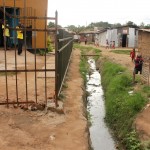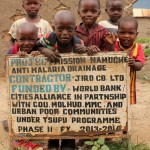Researching the politics of development
Blog

Co-producing knowledge about government vision, commitment and capacity to reduce urban poverty in Uganda

28 June 2016
By Sophie King in conversation with Katana Goretti, Peter Kasaija and Silver Owere
In the first of a series of blogs about our research on urban poverty in Uganda, Sophie King talks about the project’s inclusive research process and methodology:
In January 2016, a group of us came together to begin a process of co-producing knowledge on how governments can better support the improvement of living standards in Uganda’s informal settlements. Specifically, we are looking at the ways in which national and local government, usually in partnership with transnational actors, have gone about the delivery of water and sanitation projects in two divisions of Kampala and in two secondary towns. In the secondary towns, we are considering the outcomes achieved through the Transforming Settlements of the Urban Poor in Uganda (TSUPU) programme.
In an attempt to combine expertise in research methodology, urban planning, and social movement practice, our research partnership brings together a Western female academic, a Ugandan male academic, a team of NGO professionals from ACTogether Uganda, and leaders from the National Slum Dwellers Federation of Uganda (NSDFU). Building on existing ESID research in India, our overarching research question has been: ‘What shapes state vision, commitment, and capacity to reduce urban poverty in Ugandan towns and cities?’
Through a co-productive process, we hope to produce a richer understanding of ESID’s core research questions than a more extractive research strategy might have generated. In a sometimes
clumsy, necessarily adaptive, and occasionally systematic way, we are trying to move forward in a research team that reflects the composition of our overall partnership. Mistakes … we’ve  made a few. But we’re also excited and energised at the power of research to be transformative when it works this way. It is not easy, and with so many constraints on getting these kinds of projects financed and off the ground, we are lucky to have this opportunity.
made a few. But we’re also excited and energised at the power of research to be transformative when it works this way. It is not easy, and with so many constraints on getting these kinds of projects financed and off the ground, we are lucky to have this opportunity.
That’s why we wanted to share some of our reflections on the complex challenges we have encountered along the way: How do we balance the views and identities of experts, politicians and citizens, while generating knowledge that is practically useful for members of our partnership? How can we guarantee anonymity and confidentiality, while also making research subjects active investigators? How do we translate local experience into scholarly knowledge? And whose knowledge counts?
Making an omelette without breaking too many eggs
Our research aims to illuminate the ways in which state vision, commitment and capacity shape the character of urban poverty programming and, in turn, to throw light on what shapes the character of state vision, capacity and commitment. It therefore necessitates exploration of highly sensitive and often newly emergent relationships between local governments, communities and, in particular, young regional branches of the NSDFU. It has also followed hot on the heels of a presidential, parliamentary and often closely contested local government electoral period.
The relationships we are touching on are fragile and some of the information generated could be interpreted in many different ways – by some as evidence of failures – even of misused resources; by others as critical learning experiences on a pathway to partnership and transformation. Participants in the research reflected that it was sometimes difficult for people to speak out: “technical people would speak, but they fear the politicians knowing what they’ve said; some federation members might fear what other federation members have said”. So how have we negotiated this complex terrain? In each sample area an advance party convened a meeting of stakeholders for a detailed discussion about the research. We held day-long consultations with different leaders within the regional federations. These aimed to break down what at first glance seem like abstract ‘academic’ concepts, but which after in-depth discussion and participation in the data generation process become issues that federation members (and officials) are engaging with on a daily basis: inclusion; state capacity; political commitment; the transformation of ideas, attitudes, and visions for urban development and informal settlements. We have worked through federation members themselves to initiate relationships with local politicians and technical officials to simultaneously legitimise the role of slum-dwellers in the programmes under study, while demonstrating commitment to involving government in producing the knowledge we seek to create.
So how have we negotiated this complex terrain? In each sample area an advance party convened a meeting of stakeholders for a detailed discussion about the research. We held day-long consultations with different leaders within the regional federations. These aimed to break down what at first glance seem like abstract ‘academic’ concepts, but which after in-depth discussion and participation in the data generation process become issues that federation members (and officials) are engaging with on a daily basis: inclusion; state capacity; political commitment; the transformation of ideas, attitudes, and visions for urban development and informal settlements. We have worked through federation members themselves to initiate relationships with local politicians and technical officials to simultaneously legitimise the role of slum-dwellers in the programmes under study, while demonstrating commitment to involving government in producing the knowledge we seek to create.
This approach raises questions about methodological trade-offs – will the relationship between the scholars and their partners bias their judgement as to how things have played out on the ground? How will anonymity and confidentiality be secured? Won’t the involvement of federation members affect participant openness – particularly on the government side?
We have found overwhelmingly that the benefits outweigh the costs on all these counts. In each urban centre, we form sub-teams of professionals and federation members and we summarise and reflect on our findings as a whole team daily and weekly. We agree we will not talk about what individual research participants have said outside the boundaries of the particular members of our team and we conduct interviews anonymously. Nonetheless, a member of the federation is there as part of the conversation in each of these interactions and it is highly unlikely this does not affect the nature of what is discussed.
At the same time, NSDFU members are learning through each interaction about the ideas, attitudes and decision-making processes of the interviewee, and their understanding of the role of the
federation in shaping the behaviour of the state. The professionals who provide support to federation members across the country are enhancing their understanding of how to do qualitative research, and importantly, how to support members to work more effectively with government to secure slum-dwellers’ basic needs. The richness of the data we are generating in interaction with government is deepened by the fact that interviews slip in and out of conversations between government and citizen representatives about the work they have or have not managed to do together and the reasons why things have happened in these ways. And, as any qualitative researcher knows, some participants are open and willing, and some are closed and obstructive … how far does any researcher take the second kind beyond reversion to type?
Translation, translation, translation
We have come to recognise that our partnership bears such colourful fruit because together we are more than the sum of our parts. As scholars many removes from those with whom we are seeking to generate knowledge (a white, Western, English-speaker and a middle-class Lugandan/Swahili speaker), Peter and I face significant challenges in attempting to translate complex academic concepts into concrete every-day situations and analogies.
In contrast, through their own regular data generation practices of enumeration and profiling, and many forums for community interaction, federation leaders are highly skilled in encouraging the residents of informal settlements to think about their needs, interests and challenges and their relationships with government, as well as at communicating these to politicians and technical officials. Together we are integrating our divergent knowledges, experiences and capabilities in ways which have enabled community members to talk fluently about the drivers of inclusion within government decision-making processes and enabled government officials to reflect on the ways in which their internalised ideas about informal settlements and urban development have changed over time. Or – sometimes quite candidly – why they have not changed.
Turning the tables… is this inclusion? We agreed that we have all had a role in making decisions about the research process – but we also had a discussion about whose knowledge counts (or whose spin wins)? In fact, so far, this has been less of a challenge than some of us might have expected – through discussion and reflection we are teasing out the meanings of the information that surfaces as it emerges, without any major differences of opinion. We have yet to come to a decision about exactly how our final process of comparative analysis across our three urban centres will operate in practice, but we have learned by doing that it will have to include mechanisms for each stakeholder in the research partnership to play a role.
We agreed that we have all had a role in making decisions about the research process – but we also had a discussion about whose knowledge counts (or whose spin wins)? In fact, so far, this has been less of a challenge than some of us might have expected – through discussion and reflection we are teasing out the meanings of the information that surfaces as it emerges, without any major differences of opinion. We have yet to come to a decision about exactly how our final process of comparative analysis across our three urban centres will operate in practice, but we have learned by doing that it will have to include mechanisms for each stakeholder in the research partnership to play a role.
As a reflexive academic, I have tied myself in knots about who ‘owns’ the data we are generating and my own physical control over that information by being the main point of storage and indexing. But when I put this question to the team, it appeared quite straightforward: “you are not the controller, you are the guardian”. We agreed there was a risk in detailed soft or hard copy interview notes remaining in many different sets of hands and the federation members in all the places we have visited preferred regular verbal briefings and reflections about data gathered, with the academics in the team taking responsibility for systematic recording and storage.
But the message on inclusivity in research that I believe Western development scholars still have the most to learn from came from two forthright female leaders of the NSDFU:
“You will come and do your research, but when you have gone, it is we who will remain”.
You can find more information about the details of our research project here.
Check the blog for more videos and blogs on this project coming soon
